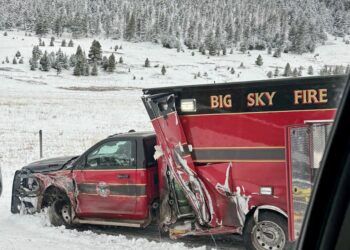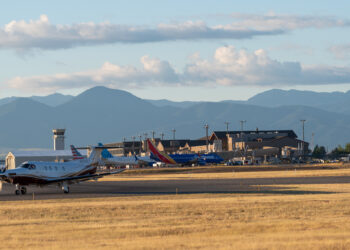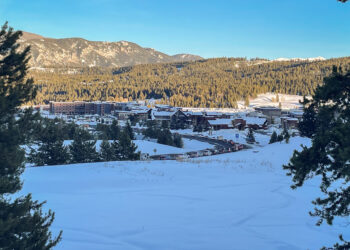
By Todd Wilkinson EBS Environmental Columnist
Wyoming’s Grand Teton: American geographic icon and arguably the most mesmerizing summit in our region.
On Tuesday, July 26, The Ellen Theatre in Bozeman is screening a mountaineering docu-drama that should not be missed. “The Grand Rescue” features the exploits of Bozeman’s own Rick Reese, who together with a group of distinguished alpinist friends staged one of the most dramatic vertical rescues on the Grand Teton in history. The event is sponsored by the Bozeman Film Society.
Over the years, there have been several truly incredible rescues launched into the Teton Range that galvanized the mystique of the Jenny Lake Climbing Rangers in Grand Teton National Park.
When Reese thinks about the 13,775-foot Grand and the three-day heroic rescue 49 years ago, he speaks humbly of kismet, pluck and brotherhood.
The August 1967 cliffhanger happened on the Grand’s North Face. It involved seven key figures whose reputations are golden in American mountaineering lore: Reese, Pete Sinclair, Leigh Ortenburger, Bob Irvine, Mike Ermarth, Ralph Tingey and Ted Wilson. Four were childhood climbing buddies from Utah.
Besides his climbing experience, Reese is well-known and respected as a conservation leader. He was one of the founders and first president of the Greater Yellowstone Coalition and previously, with his wife Mary Lee, directed the Yellowstone Institute in Yellowstone National Park.
“The Grand Rescue” is a perfect summer film that will keep you at the edge of your seat. A share of ticket proceeds will go to the Gallatin County Search and Rescue Unit. After the documentary, Reese and rescue colleague Bob Irvine, who directed Teton Mountain Rescue Unit for 28 years, will be joined on stage at the Ellen for a provocative Q-and-A. Not long ago, Reese and I had a brief chat.
TODD WILKINSON: Looking back to that stretch of days in August 1967, what still stirs in the gut?
RICK REESE: There were a lot of things that could have gone wrong up there. I always say that in climbing, as in life, luck frequently plays a role, good and bad, but you count on circumstances to go one way or another. In many respects, we were extremely lucky.
T.W.: How so?
R.R.: We had perfect weather, a key factor. To put [it] in perspective, I was on Teton Glacier exactly one year to the week after the rescue, in 1968. As a result of a storm, there [were] 15 inches of new snow on the North Face of the Grand and soft-snow avalanches coming off of it. Had we confronted those conditions in 1967, it would’ve changed everything. It was also pure luck that two key members of the team, Bob Irvine and Leigh Ortenburger, just happened to be on the mountain that day to join us. Without them it would have been a far more daunting experience.
T.W.: Another drama involves the contention that rescuers should have used a tragsitz to essentially piggyback Campbell out. Was that really practical?
R.R.: Given the fact that the victim had open compound fractures in his leg, the entire limb had to be completely immobilized. There are several arteries in the lower leg. If one had ruptured, I don’t think he would’ve made it.
T.W.: Still, the decision to use a litter was perilous in its own way.
R.R.: The cable we were using to evacuate him was just 3/16-inch in diameter. We descended 2,000 feet, including two separate lowerings of 300 feet—equivalent to a football field in distance—each. We were dragging the line across sharp edges during the entire rescue. Had the cable failed, it could have been a disaster. We may have lost the victim, the ranger with him and the belayer, at a minimum.
T.W.: Vice President Hubert Humphrey called you heroes and Interior Secretary Stewart Udall brought you to Washington, D.C. to receive the Citation for Valor.
R.R.: The movie makes it sound like our skill and daring saved the day. There was skill and experience, sure. But an amazing set of events at the onset of the rescue brought the seven of us together.
T.W.: Does the Grand speak to you the same way today as it did then?
R.R.: I have a huge amount of respect and love for the Tetons, though in those days there were no advanced telecommunications or sophisticated, well-rehearsed protocols for approaching rescue. It was old school. In my memory, it seems the mountain was a little more wild.
T.W.: What’s different today?
R.R.: The Grand seemed more remote then. With everyone carrying cell phones today, and the size and impressive skill of a much larger ranger climbing corps, and the capabilities of modern rescue helicopters, if you have an accident like that now, you can call for help and be off the mountain safely in a couple of hours.
“The Grand Rescue” is also scheduled to appear on Montana PBS Aug. 24 at 9 p.m.
Todd Wilkinson writes his New West column every week, and it’s published on explorebigsky.com on EBS off weeks. He is author of the award-winning and critically acclaimed “Grizzlies of Pilgrim Creek, An Intimate Portrait of 399, the Most Famous Bear of Greater Yellowstone,” featuring 150 amazing photographs by Thomas D. Mangelsen. The book is only available at mangelsen.com/grizzly and when you order today you will receive a copy autographed by both author and photographer. Wilkinson also wrote a profile of Yellowstone Superintendent Dan Wenk for the summer 2016 edition of Mountain Outlaw magazine, now on newsstands.












